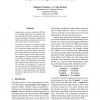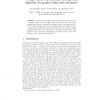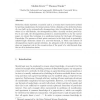906 search results - page 22 / 182 » Chain Dominated Orders |
ACL
2008
13 years 8 months ago
2008
Hand-coded scripts were used in the 1970-80s as knowledge backbones that enabled inference and other NLP tasks requiring deep semantic knowledge. We propose unsupervised induction...
ECIS
2003
13 years 8 months ago
2003
Knowledge about customers is vital for supply chains in order to ensure customer satisfaction. In an ideal supply chain environment, supply chain partners are able to perform plan...
SWAT
2004
Springer
14 years 22 days ago
2004
Springer
The first polynomial time algorithm (O(n4 )) for modular decomposition appeared in 1972 [8] and since then there have been incremental improvements, eventually resulting in linear...
CDC
2009
IEEE
13 years 11 months ago
2009
IEEE
This paper studies the input design problem for system identification where time domain constraints have to be considered. A finite Markov chain is used to model the input of the s...
JAPLL
2006
13 years 7 months ago
2006
Deduction chains represent a syntactic and in a certain sense constructive method for proving completeness of a formal system. Given a formula , the deduction chains of are built...



